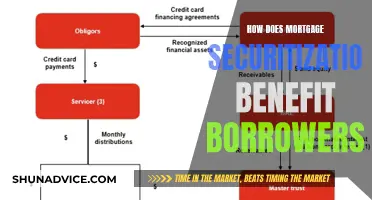
Finding out who owns the mortgage on a property can be a tricky task. This is because mortgages are often sold and bought multiple times, meaning the company you send your monthly payments to may not be the owner of the mortgage. There are several ways to find out who owns the mortgage on a property, including using online tools, contacting your mortgage servicer, or visiting your local tax assessor's or county recorder's office.
| Characteristics | Values |
|---|---|
| Finding out who owns the mortgage on a property | Difficult, but important |
| First steps | Identify your loan servicer, which may be different from the loan holder |
| How to identify your loan servicer | Check your monthly mortgage statement, coupon book, or closing document |
| Online tools | MERS, Fannie Mae, Freddie Mac, Property Shark, NextAce, Search Systems, RealtyTrac, Rocket Mortgage |
| Offline tools | County or city recorder's office, county records office, title company, title agent |
What You'll Learn

Check public records
Public records are a great way to find out information about a property's mortgage. They are easily accessible to the public and can be obtained at minimal or no cost. The Freedom of Information (FOI) laws give the public access to certain data held by the government.
In the United States, each state has different laws, called "recording statutes", regarding home deeds and mortgage documents. However, each state requires the formal recording of real property in a county office for it to be valid. This means that almost every properly recorded property will have a mortgage record on a public file.
To access these public records, you can visit the county clerk's office, the office of public records, or the public or county recorder's office. Some counties may not publish property records online, so you may have to visit the county records office in person and use a public terminal to look up the land records. Many counties and cities maintain a searchable online database of public home ownership information. For example, San Francisco allows members of the public to search for property information by entering the property address or highlighting the property on a city map.
Before searching for public mortgage records, you will need to obtain some basic information about the property, such as the property address or the owner's name. If you don't have this information, you can contact a real estate agent to help you gain this information.
There are also some online services that allow you to access home ownership information, tax records, liens, and mortgage information. For example, Property Shark provides some information for free, but access to the full property records requires a paid subscription.
Canceling a Mortgage Contract: Is It Simple?
You may want to see also

Contact your mortgage servicer
Contacting your mortgage servicer is a good first step in determining who owns or backs your mortgage. Your mortgage servicer is the company that you send your mortgage payments to each month. This is the company you need to contact about your mortgage assistance options.
If you don't know who your mortgage servicer is, you can find their contact information on your monthly mortgage statement or coupon book. You can also look up your mortgage servicer by searching the Mortgage Electronic Registration Systems (MERS) website. If you have a Mortgage Electronic Registration System (MERS) loan, call the MERS Servicer Identification System toll-free at 888-679-6377. If you're unsure whether you have a MERS loan, you can also get this information from the MERS website.
Once you have identified your mortgage servicer, you can call them to ask who holds your loan and who backs it. They are required by law to provide you with this information. You can also send a Qualified Written Request or a Request for Information to your mortgage servicer. They are obligated to respond within 30 days, providing the name, address, and telephone number of the owner of your loan.
If you are facing financial uncertainty, it is a good idea to ask your mortgage servicer about what mortgage relief options are available to you. They will ask you about your finances, so it is helpful to have information such as recent pay slips, tax returns, and bank statements ready. They will then explain the range of mortgage assistance options that might work for you. It is important to ask questions and confirm what will happen next.
Understanding Default: The National Mortgage Association's Definition and Implications
You may want to see also

Use online tools
There are several online tools that can help you find out who owns the mortgage on a property. It's important to note that the company you send your mortgage payments to might not be the loan owner, as loans are often sold to other entities.
Firstly, you can identify your loan servicer, which is the company that sends you the bill for payment. You can find this information on your monthly mortgage billing statement or coupon book. Once you have identified your loan servicer, you can contact them to ask who owns your mortgage loan. By law, they are obligated to provide you with this information.
Secondly, if your loan is in the MERS (Mortgage Electronic Registration Systems) system, you can determine who owns or backs your loan by calling MERS or using their website. MERS is a national electronic registry system that tracks changes in servicing rights and ownership interests in mortgage loans.
Thirdly, you can use the lookup tools provided by Fannie Mae and Freddie Mac, two large lenders that often own mortgage loans. If your loan is owned by either of these entities, you should be able to find this information using their online tools.
Additionally, you can try searching for property ownership information through public records or archives, which may be available at your local library or your county's public records website. Real estate agents can also help in this regard, as they have access to public property data as well as a database called the Multiple Listing Service (MLS). They can provide valuable insights into the property and its history, helping you make informed decisions.
Avoiding Foreclosure: Understanding Vanderbilt Mortgage's Grace Period
You may want to see also

Consult a real estate agent
If you are looking to find out who owns the mortgage on a property, consulting a real estate agent can be a good option. Real estate agents have access to a wide range of resources and tools that can help in this process. Here are some ways in which a real estate agent can assist:
Access to Public Property Data and Multiple Listing Service (MLS)
Real estate agents have access to public property data, which can provide valuable information about the property's ownership, history, and previous owners. Additionally, agents can utilize the Multiple Listing Service (MLS), a database that can indicate if a property is currently for sale or has been recently sold. This can help in identifying the current owner and any associated mortgage information.
Expertise in the Local Market and Industry Connections
Experienced real estate agents possess a deep understanding of the local market. They can review mortgage information and numbers with you, helping you interpret the data effectively. Their industry connections and relationships with lenders, brokers, and other professionals can facilitate gathering information about property ownership and any associated mortgages.
Conducting Lien Searches and Due Diligence
Real estate agents are skilled in conducting lien searches, which can reveal mortgage information along with other liens against the property. They understand the importance of due diligence and can guide you through the process of gathering mortgage details, financial information, and any potential issues impacting the property.
Assistance in Contacting Listing Agents and Negotiating
If the property is currently listed for sale, a real estate agent can facilitate communication with the listing agent to obtain additional information. They can also provide valuable insights into the negotiation process, helping you craft a fair offer that takes into account the property's mortgage status and any other relevant factors.
Guidance in Navigating Complex Processes
The process of buying or investing in a property can be complex, especially for those new to the industry. Real estate agents offer personalized guidance, ensuring you have the necessary information to make informed decisions. They can explain the mortgage details, any existing loans, and how these factors may impact your purchase or investment strategy.
Consulting a real estate agent can save you time and provide valuable insights when trying to determine who owns the mortgage on a property. They can navigate the complexities of property ownership, mortgage records, and industry connections to help you gather the information you need.
USDA Mortgage: Judgment Checks and Balances
You may want to see also

Hire a title company
If you're looking to find out who owns the mortgage on a property, one option is to hire a title company to conduct a title search. A title company can run a preliminary title examination, which will reveal the homeowner of record, any outstanding mortgages or liens on the property, and the holders of those mortgages and liens. This can be particularly useful if the property is in foreclosure or if you're concerned about potential claims or liens on the property.
A title search involves digging into a property's public records to establish a chain of title and confirm that the seller is the rightful owner. This process is typically carried out by an attorney or title company, and it's an important step in the mortgage underwriting process to protect both the lender and the buyer. It's worth noting that mortgages are recorded documents and public records, so you may also be able to find this information yourself by reviewing the online records for the county or city where the property is located. However, if you prefer to have a professional handle it or if the records are not available online, hiring a title company is a viable option.
When conducting a title search, the title company will review various legal documents and public databases to uncover any potential issues with the property's title. This includes checking for any outstanding mortgages, liens, encumbrances, or other claims on the property. For example, they will look for any unpaid property taxes, homeowners association (HOA) fees, or unpaid bills for previous home improvements that could become the responsibility of the new owner. They may also uncover filing problems, such as misspelled names, or more significant issues like unresolved building code violations, which could impact the sale.
By hiring a title company, you can rest assured that a thorough investigation into the property's title has been conducted, reducing the risk of any unexpected claims or liabilities arising in the future. It's important to note that you may be able to purchase title insurance or a warranty of title to further protect yourself from potential claims. Additionally, if you're considering purchasing a foreclosed property, there are websites like RealtyTrac that provide data on foreclosed homes and can be a useful starting point for your research.
Prime Mortgage Fluctuations: Understanding the Rise and Fall
You may want to see also
Frequently asked questions
There are several ways to find out who owns the mortgage on a property. Firstly, you can find out by identifying your loan servicer. You can find their number on your monthly mortgage statement or coupon book. You can then call them and ask for the mortgage holder's information. You can also send them a written request for this information. Secondly, you can use online tools to look up who owns the mortgage. For example, you can use the Fannie Mae and Freddie Mac loan lookup tools on their websites. You can also use the MERS (Mortgage Electronic Registration Systems) website to look up your mortgage servicer. If your loan is in the MERS system, you can determine who owns it by calling MERS or checking their website. Finally, you can find out who owns the mortgage by checking the public records at the county or city recorder's office.
A mortgage servicer is a separate entity from the owner of the loan. Their responsibilities include collecting monthly payments, maintaining escrow accounts, and distributing funds to other parties (e.g. local tax authorities, insurers, and the owner of the loan).
The mortgage lender is the financial institution that loaned you the money. They are also called the "note holder" or "holder". The lender might sell the mortgage debt to another entity, which then becomes the new loan owner (holder). The mortgage servicer is usually a different entity from the owner of the loan and is responsible for the day-to-day loan processing activities.
You will need to know who owns your mortgage if you want to refinance your home, ask for a loan modification, or request forbearance if your monthly payments have become unmanageable. You will also need this information if you are late with your monthly payments.
There are several ways to find out who owns a property. You can try your local tax assessor's office or the county recorder's office. Property information is public record, so you may be able to find out who owns the property, as well as the history of the property and who owned it before the current owner. You can also use online services such as Property Shark, which provides access to home ownership information, tax records, and mortgage information. You can also use a title search, but this will generally cost you $75 to $200 or more.







